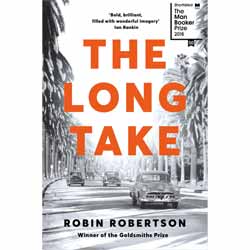|
Click here to return to the main site. Book Review
The long take in the title of this masterpiece of modern literature, springs from the three minute plus uncut shot in the Joseph H. Lewis film noir classic Deadly is the Female (1950) better known to us these days as Gun Crazy, starring the under-appreciated John Dall (Rope [1948] and Spartacus [1960]) and the immortal Peggy Cummins (1925 – 2017) whose Welsh accent never gave itself away as an American homicidal gun moll. Robin Robertson’s alter ego, Walker, learns how the shot was done from Lewis himself, how Dall and Cummins basically improvised for whatever came rolling their way, how Cummins psychologically ran the whole scene while the camera rolled, how nothing like this had ever been done before (or since), how Dalton Trumbo, co-writer of the script was headed for prison that year for not song-birding against the Hollywood Ten blacklist and the HUAC crypto patriots whose ‘fix-it’ man Roy Cohn would be idolized a generation later by President Donald Trump - and - how Lewis breaks off the conversation in the bar with Walker when another reporter calls him a kike. The Long Take is the best grounding for understanding noir this movie addict has ever seen. The twenty or so noir films Robertson covers (among them: Criss Cross, Ride the Pink Horse, Brute Force, The Killers, The Naked City, The Big Combo, Night and the City, D.O.A. The Sniper, Dark Passage, Kiss Me Deadly, Sudden Fear, The Lady From Shanghai) have never been so closely and lovingly touched, scrutinized and understood. Robertson’s alter ego, Walker, is a reporter in L. A. and lives in boarding houses which are location sites for these movies, he’s credit savvy enough to know his directors and meet them on the sets. He knows John Alton is the cinematographer who paints with light. And by the way, he never uses the noir word to contemporaneously describe these art pieces because the French hadn’t given it to us yet. But he did know they were the spawn of the Shakespearean two-backed beast where German expressionism meets the American dream, make that nightmare. Walker is a veteran of War II, D-Day, France, killing close up, blasé butchering seen through blank eyes, human pulp with a grin. He can’t go home to Canada. Home is gone. Girlfriend and family still breathe but it’s impossible to know them. So he takes to the streets and sets up shop in the bottle. New York City is depicted on the first page with the best description anyone has ever seen, done or hoped to do of that city’s street level existence. Walker heads west and gets work with an L.A. paper, one part tabloid, one part crusader for the people, one part Nathanial West Sisyphus hill-climb up Mount Apocalypto for souls like Walker who are cursed with caring. For on top of his post war stress scars, flashbacks and fear of loud mechanical roar, Walker is cursed with that human quality cynics laugh at. But then, cynics are cowards, are they not? He befriends and is befriended by people of colour, he listens to their stories; he hears the grief of cast-off veterans, something American and U.K. big combo-bureaucracies are so adept at forgetting. He remembers the forgotten souls and he writes about them. But here, dear Reader, here is the kick. This is a book of Poetry. The Long Take is the most important work of poetry anyone has faced. Ever. Triple layering of war memories, street desolation and cold news items, Robertson gives us his vision in blank verse. His literary roots certainly know of West, Miller’s stream of consciousness in Tropic of Capricorn and, yes, even James Ellroy in his trilogies. But better than all of them. By light years. The vocabulary is stunning, its hieroglyphic imagery searing into the mind with an inescapable psychological etching of phrase that cannot be shaken off in a lifetime of acrostic wordsmithing. Robertson is living in London these days. London is lucky. Buy his poetry for a lifetime of reading and rereading. 10 John Huff Buy this item online
|
|---|


